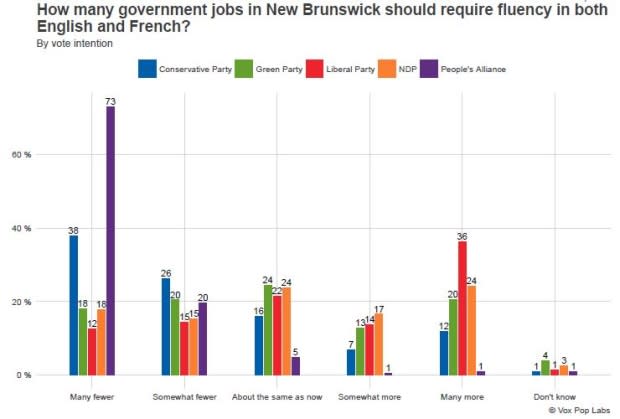Stark divide on language issues, Vote Compass data suggests
New Brunswickers — especially anglophone residents — want the number of government jobs that require both English and French to drop, according to more than 10,700 responses to a recent survey.
Data gathered from the Vote Compass feature indicate 49 per cent of respondents want to see fewer bilingual positions compared to 30 per cent who want more, and 19 per cent who are fine with the status quo.
Language continues to a be divisive election issue, and survey findings show a stark contrast among respondents on questions of bilingualism in the public service, the future of the Official Languages Commissioner and whether the province should protect the French language.
Asked whether New Brunswick should no longer have an Official Languages Commissioner, 43 per cent either somewhat or strongly agreed. Thirty-eight per cent disagreed and 13 per cent remained neutral.


"The trends and the answers probably wouldn't surprise anyone who follows New Brunswick politics closely, except for the clarity of the positions of the People's Alliance supporters," said J.P. Lewis, an associate professor of politics and history at the University of New Brunswick Saint John.
Like-minded PANB voters
When the data is broken down by voter intention, 95 per cent of People's Alliance supporters were staunchly in favour of fewer government jobs that require both English and French and 89 per cent of those voters want to get rid of the languages commissioner.


One of the major People's Alliance platform planks is the promise to eliminate duality in government services, eliminate the language commissioners' office and base bilingual hiring "where numbers warrant."
"If you are identifying with the People's Alliance, you're probably following these policy positions, and I think it's some of the strongest examples in all of this [Vote Compass] data where party vote intention fit with a policy position," Lewis said.
Half of Liberal supporters want more bilingual government jobs and 59 per cent say they disagree with eliminating the commissioner — unsurprising figures considering much of the Liberal base is found in francophone or bilingual communities.
And there lies a problem for the Tories.
Battling two fronts
To regain power, the Progressive Conservatives need to make inroads in Liberal-held territory while fending off the People's Alliance in historically blue ridings. It creates a difficult line to walk for a party trying to reach francophones but not bleed voters to the Alliance.
"It's probably a question in the Higgs campaign room about how much they want to address these concerns head-on if they're losing votes in that direction, especially because I think it's riding by riding," Lewis said.
"Are there ridings where if they don't go far enough on those language issues, they lose votes to the People's Alliance?"
Fredericton-Grand Lake, where leader Kris Austin is running, is a prime example, he said.
The PCs have already mirrored part of the Alliance's and Leader Blaine Higgs urged the public to avoid splitting the vote.
However, Lewis said the People's Alliance still has yet to win a seat and so the party's overall impact on the issue remains to be seen.
"If you make the comparison to an upstart party, like the Reform Party in the early 90s, they were pushing on some issues, like they were against official multiculturalism and they didn't win that argument," he said.
By native language
When the data is broken down by native language, English and French respondents are almost polar opposites on the issues.


The languages commissioner is an independent office of the legislative assembly that investigates and makes recommendations related to compliance with the Official Languages Act.
Former Commissioner of Official Languages Katherine d'Entremont, was at the centre of several controversies, including the issue bilingual workers in the public service, during her time in office. In her final report, she urged elected politicians to debunk myths that fuel anti-bilingualism sentiment.
A note on methodology
Developed by a team of social and statistical scientists from Vox Pop Labs, Vote Compass is a civic engagement application offered in New Brunswick exclusively by CBC and Radio-Canada.
The findings are based on 10,723 responses who participated in Vote Compass from Aug. 24, 2018, to Sept. 18, 2018.
Unlike online opinion polls, respondents to Vote Compass are not pre-selected. Similar to opinion polls, however, the data is a non-random sample from the population and has been weighted in order to approximate a representative sample.
Vote Compass data has been weighted by gender, age, education and country of birth to ensure the sample's composition reflects that of the actual population of New Brunswick, according to census data and other population estimates.
Subscribe to our election newsletter
Get the latest election updates delivered right to your inbox with The 506er. Subscribe here. And then let us know what you think by emailing us: the506er@cbc.ca

